Key takeaways:
- Ethical decision-making in advocacy involves balancing personal values with the realities faced by others, emphasizing empathy and understanding.
- Pro-life advocacy is rooted in compassion and the recognition of the intrinsic value of every life, encouraging dialogue rather than division.
- Real-life ethical dilemmas require navigating emotional landscapes with care, highlighting the importance of individual stories in decision-making.
- Reflecting on personal decisions can lead to growth, revealing the complex interplay between beliefs and the relationships we maintain.
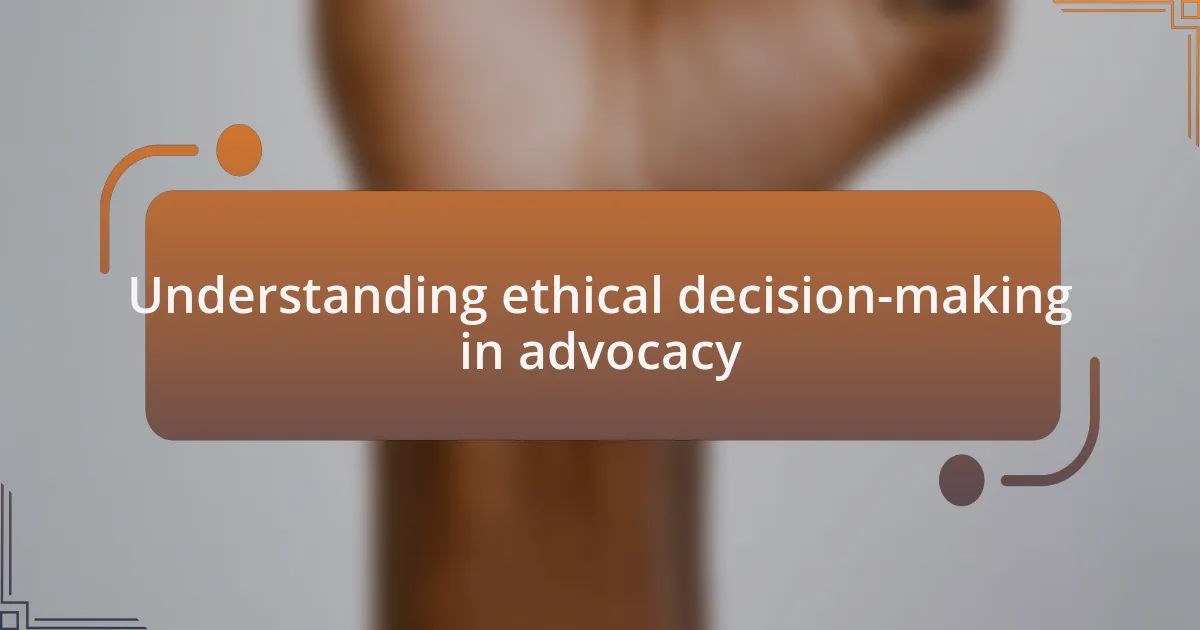
Understanding ethical decision-making in advocacy
Ethical decision-making in advocacy often requires me to weigh my values against the realities of the situation at hand. For instance, there have been times when I’ve found myself torn between pushing a strong message and respecting the deeply held beliefs of those I engage with. How can we advocate passionately without alienating individuals who are simply on a different journey?
I remember a particular event where I faced opposition from a group with beliefs that starkly contrasted with my own. Instead of rigidly defending my stance, I chose to listen and understand their perspective, which opened a dialogue that ultimately transformed the atmosphere. This experience reaffirmed for me that ethical decisions often lie in the gray areas of conversation, not just the black-and-white assertions we want to make. It’s in these moments of vulnerability that real connection—weaving empathy and respect with advocacy—can flourish.
Navigating ethical dilemmas can be frustrating, especially when passion drives our cause. Yet, I’ve come to appreciate that it’s essential to be deliberate in our choices and actions, considering the broader impact on the community we advocate for. What guiding principles do we adhere to during these challenging times? Personally, I find that grounding my decisions in compassion and understanding not only strengthens my resolve but also fosters an environment where meaningful change can truly take root.
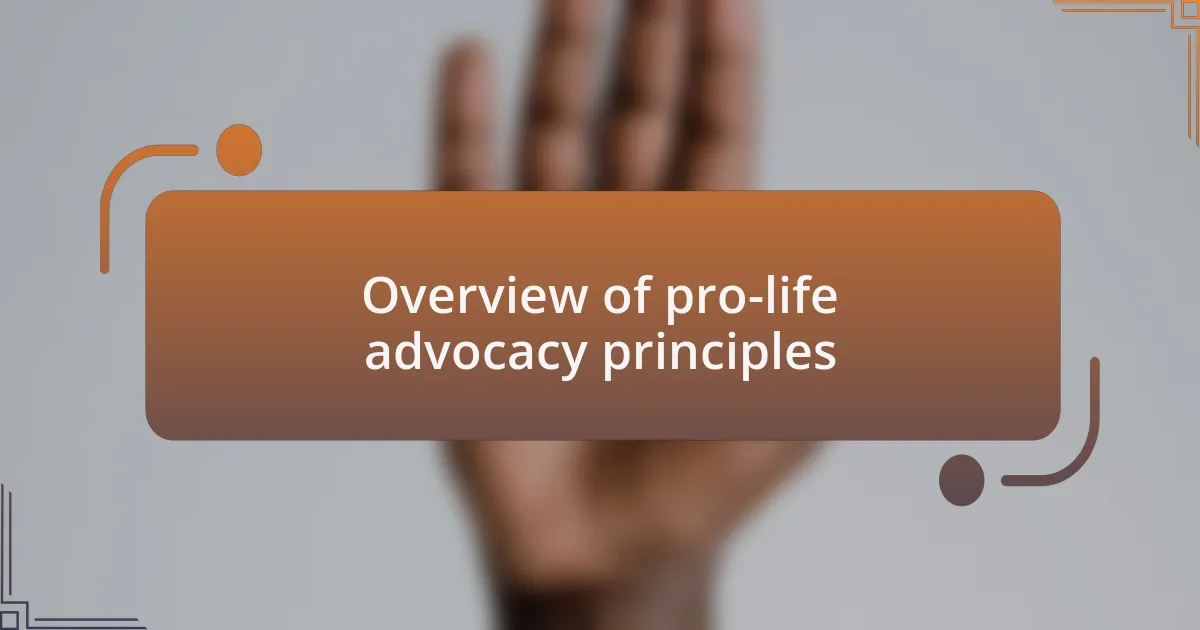
Overview of pro-life advocacy principles
Pro-life advocacy is anchored in the fundamental belief that every human life is inherently valuable, regardless of circumstances. I often remind myself that this perspective is not merely a position but a call to respect life at all stages, addressing complex issues like pregnancy, abortion, and the care of the disadvantaged. With each encounter, I reflect on how our commitment to life can shape our conversations and actions.
An essential principle I hold dear is the importance of compassion in our advocacy. I recall a time when I engaged with a woman who was considering her options amidst a difficult pregnancy. Listening to her fears and feelings allowed me to express support in a way that respected her humanity while still sharing my pro-life beliefs. It’s moments like these that highlight how empathy can lead to a deeper understanding of both sides, encouraging dialogue rather than division.
Furthermore, a core tenet of pro-life advocacy is fostering a community that supports mothers and families. In my experience, what often gets overlooked is the need for practical assistance—resources like counseling, healthcare, and financial support. I have observed that when we actively demonstrate solidarity with those in challenging situations, we not only embody our principles but also inspire others to join us in nurturing life and hope. How can we create a culture that uplifts everyone, especially the most vulnerable? This is an ongoing question that fuels my passion in this journey.
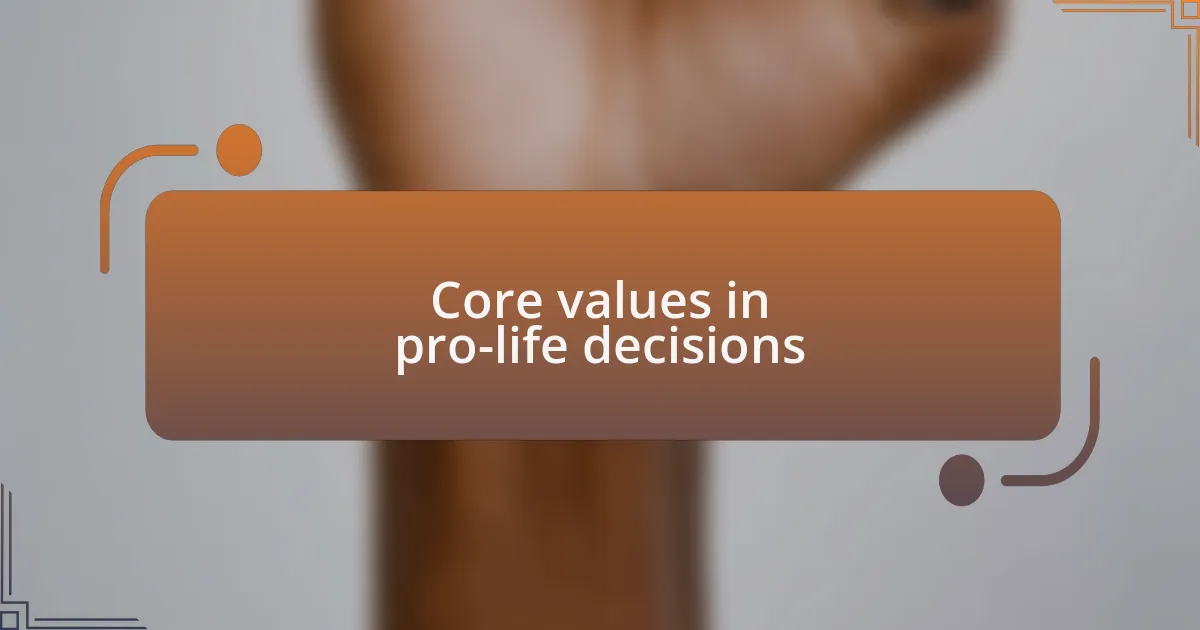
Core values in pro-life decisions
In navigating pro-life decisions, the value of integrity stands out to me. I’ve often found myself in discussions where sticking to one’s principles can be challenging, especially when met with differing opinions. Yet, I believe that staying true to the belief in the sanctity of life, even in uncomfortable conversations, reinforces our commitment and fosters respect.
Another core value is the idea of respect for individual circumstances. I remember a young couple I met who faced unexpected challenges with their pregnancy. Understanding their unique situation helped me realize that we must acknowledge the complexities of life decisions without judgment. This respectful approach not only builds trust but also opens the door for genuine conversations about the value of life.
Finally, the importance of hope cannot be overstated. I vividly recall volunteering at a pregnancy resource center where I witnessed the transformation of women who felt hopeless and alone. By providing them with encouragement and a supportive environment, I saw firsthand how hope can change hearts and minds. Isn’t it our responsibility to foster hope, empowering individuals to choose life amidst uncertainty?
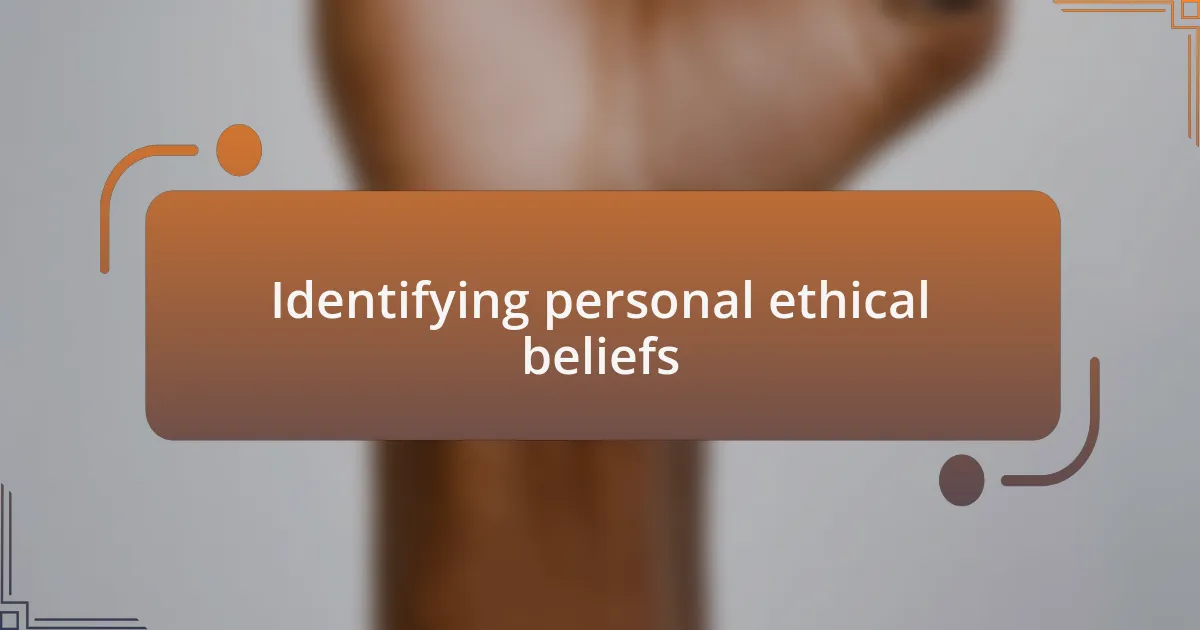
Identifying personal ethical beliefs
Identifying personal ethical beliefs can be a deeply introspective journey. I remember grappling with my own stance on life issues during my college years. It wasn’t just about what I was taught; it was about what resonated with my own experiences and emotions. When I began to articulate my beliefs, I realized they were rooted in key moments in my life that shaped my understanding of compassion and responsibility.
As I reflected on these beliefs, I found it helpful to examine the influences of my upbringing, faith, and community. One experience that stands out is a discussion I had with a close friend who faced a difficult choice regarding her pregnancy. Listening to her story made me confront my ethics head-on. It was a reminder that our beliefs often evolve when we confront real-life situations, urging us to prioritize empathy and understanding.
In my journey, I learned that identifying personal ethical beliefs isn’t just a mental exercise; it involves listening to my heart and those around me. When I encounter conflicting views, I often ask myself, “What does it mean to truly support life?” That probing question leads me to a deeper understanding of my values, emphasizing that every decision is intertwined with the complexities of human experience. It’s a process that challenges me but ultimately enriches my commitment to pro-life advocacy.
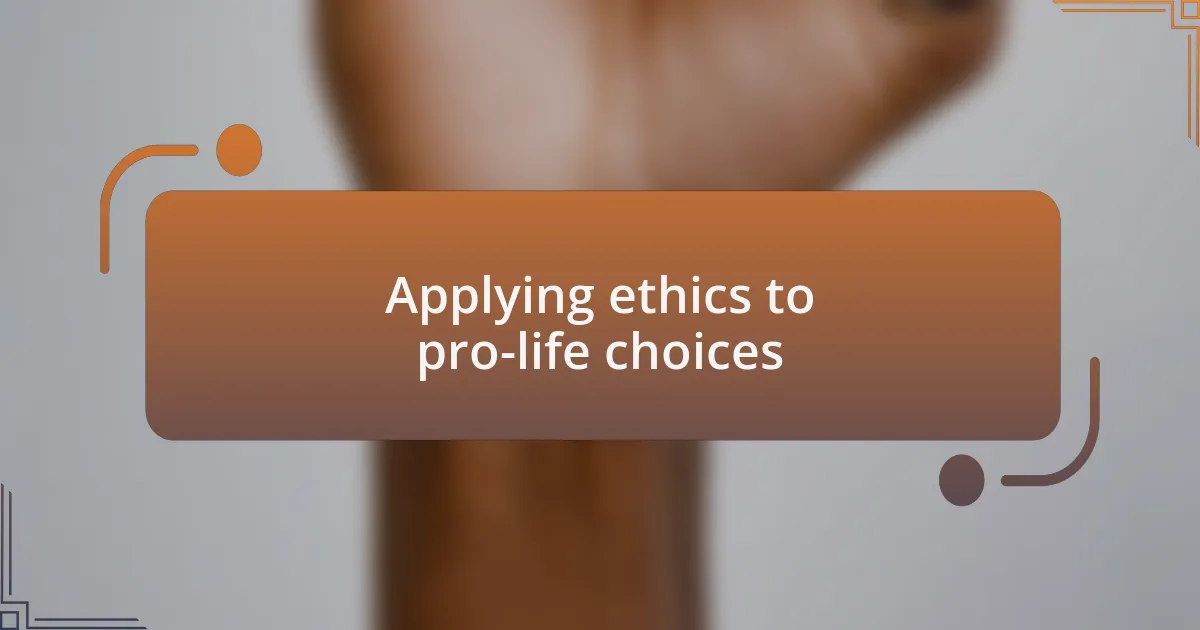
Applying ethics to pro-life choices
Applying ethics to pro-life choices requires a delicate balance of head and heart. I recall a situation where a friend shared her struggle after discovering an unexpected pregnancy. Her fear and uncertainty were palpable, and it forced me to reflect—how could I support her while remaining true to my beliefs? I realized that ethical decision-making isn’t about rigid rules; it’s about navigating emotional landscapes with compassion.
One essential aspect of ethics in pro-life choices is recognizing the value of every individual’s story. I often think about the experiences that shape our choices. When we encounter diverse perspectives, like a mother considering adoption, it opens a dialogue that challenges my views and urges me to set aside judgment. What if we approached these discussions with curiosity rather than preconceived notions? This shift in perspective can foster deeper connections and understanding.
Ultimately, I believe that applying ethics to pro-life choices means committing to a journey of learning and growth. I find myself constantly asking, “How can I support life in all its forms?” This question isn’t just theoretical—it’s a guiding principle that propels me to engage with those facing tough decisions. In embracing this mindset, we become advocates not just for life, but for a compassionate and understanding approach to the myriad of choices individuals face.
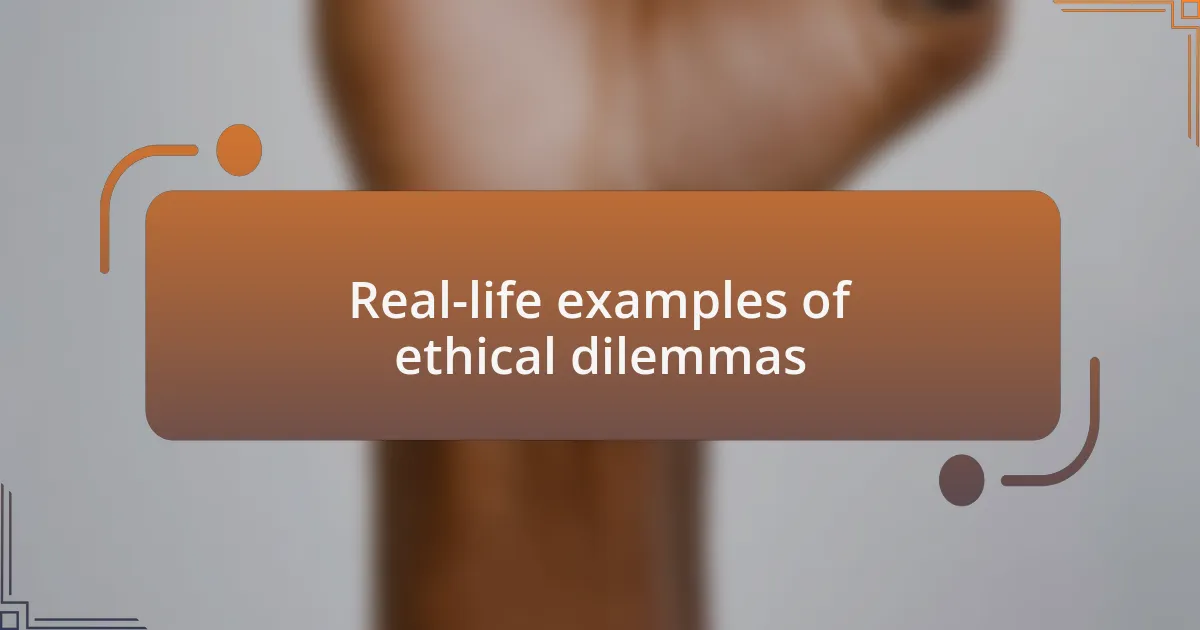
Real-life examples of ethical dilemmas
Some ethical dilemmas arise when friends or family members grapple with deeply personal decisions about pregnancy. I recall attending a family gathering where my cousin shared her plan to terminate an unplanned pregnancy due to financial struggles. Hearing her story made me want to scream in protest while also feeling an immense sadness for her plight. How do we reconcile our beliefs with the harsh realities that others face? This dilemma tugged at my heart, showing me that ethical decision-making isn’t just about conclusions but understanding the journey and burdens of others.
Consider a scenario where a healthcare professional must decide whether to provide life-saving treatment to a newborn facing severe disabilities. I once spoke with a doctor who had to confront this dilemma firsthand. She expressed her inner conflict: “Is it ethical to push for every possible option, knowing the child may suffer?” Such moments challenge the core of our values and push us to think critically about what life truly means and how we define quality and worth.
Then there’s the nuance of supporting women in crisis. I met a woman volunteering at a pregnancy center who shared her experiences with expectant mothers feeling overwhelmed and alone. One particular story stood out—she recounted how she helped a young girl choose life against the odds. Hearing her say, “I just wanted her to know she wasn’t alone,” struck me. Isn’t that the essence of ethical decision-making? It’s not merely about choices but about the connections we forge during the toughest moments.
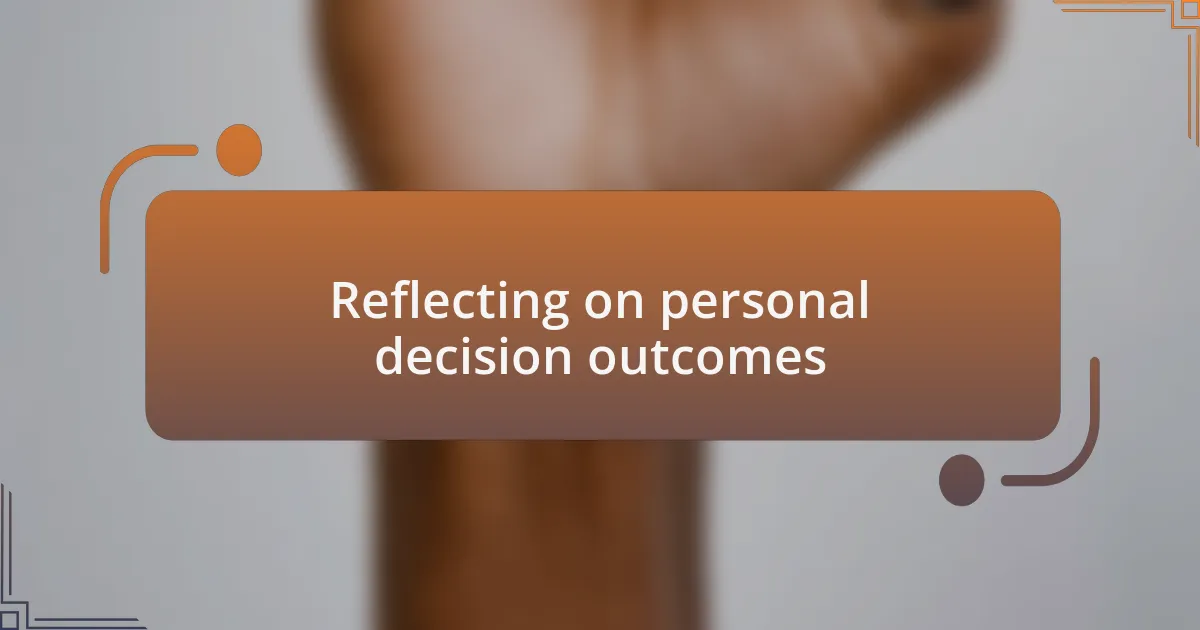
Reflecting on personal decision outcomes
Reflecting on the outcomes of my personal decisions regarding ethical dilemmas has been quite enlightening. I think back to a time when I had to decide whether to speak up in a heated discussion about abortion with a close friend. While the fear of damaging our relationship loomed large, I chose to voice my beliefs. The aftermath was bittersweet; we aired our differences but also deepened our understanding of each other’s perspectives. It made me realize that ethical discussions often lead us to uncomfortable places, yet it’s in this discomfort that growth occurs.
One decision that particularly haunts me still was witnessing a family member grapple with their unwanted pregnancy. I hesitated to share my views, fearing they might not be welcomed. Eventually, I encouraged open dialogue. The relationship was tested, but ultimately, it paved the way for a genuine conversation about values and choices. Reflecting on this experience, I recognize that sometimes the hardest conversations yield the most significant insights and connections, even when the outcomes are not what we might hope for.
In my journey of ethical decision-making, I’ve learned the importance of hindsight. When I made a choice that went against my pro-life beliefs, I often found myself pondering, “What would I have done differently?” This reflection not only sheds light on my values but also prompts a deeper understanding of how my decisions impact those around me. Looking back, I see how important it is to acknowledge the emotional gravity of each choice, as it shapes not just our moral framework but also our relationships with others.